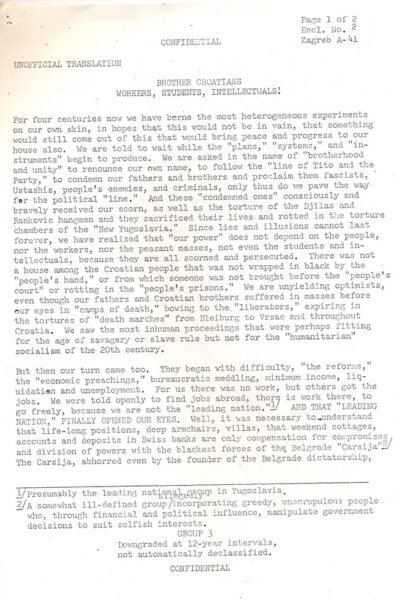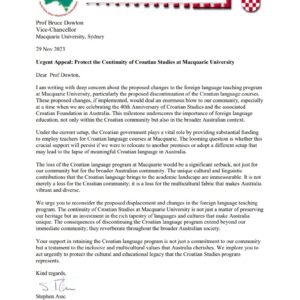1970 Important Evening For Croatia
This article by the Croatia-based American author, writer and well known freedom and democracy activist, Julienne Busic (Julienne Eden Busic) was first published in November 2020 in dijaspora.hr. Articles like this are to my opinion most important in reminding us of the human suffering Croats endured under communist Yugoslavia where the dictator Josip Broz Tito together with Serbs who took up most positions of power inflicted oppression, humiliation, degradation and mass murder of patriotic Croats particularly during the post-World War Two years. I (Ina Vukic) have decided to publish here this article from 2020 which succinctly and masterfully brings to the reader what sacrifices, and determination (including leaflet throwing from skyscrapers such as the one in Zagreb, Croatia on 28 November 1970) were essential during the 1970’s to spread the plight of freedom from communism and here it is:
“… It was exactly fifty years ago, November 28,1970, the night before the former Republic Day in the former Yugoslavia. A friend and I were sitting on the top of the skyscraper, then a disco, on Ban Jelacic Square (Zagreb, Croatia). We silly Americans didn’t know that Croatians began partying late, around 10pm, so we had arrived a full three hours too early and the disco was empty. Lying on the floor next to us was a large canvas bag containing thousands of leaflets in the Croatian language that I had received from my boyfriend and later husband, Zvonko Busic, and they all contained an inconvenient truth. Back then, however, there was only one monolithic truth: Tito’s. And it was diametrically opposed to what was written in our leaflets: Yugoslavia was not a utopia in which all were equal, or an economic wonder, or a bastion of solidarity. It had the highest percentage of political prisoners by population in all of Europe, and its touted “Communism with a human face” was held together by force and terror. “Brothers, Croatians, Workers, Students, Intellectuals”, the leaflets read, “…we are asked in the name of brotherhood and unity to renounce our own name, to follow in the line of Tito and the party, to condemn our fathers and brothers…..who sacrificed their lives and rotted in the torture chambers of the “New Yugoslavia”… Economic failures and mass emigration were also addressed: “the reforms, economic preaching, bureaucratic meddling, minimum wage, liquidation and unemployment”. These were issues about which there was widespread discontent among all the nations, not just the Croatians. But as far as emigration was concerned, Croatians comprised the majority: “for us there was no work, but others got the jobs. We were told openly to find jobs abroad…because we are not the ‘leading nation’….”
In its detailed report on the leaflet-throwing incident a few months later, the U.S. Embassy pointed out that “the offending leaflet does not call for violent action within Yugoslavia. Instead, it urges Croatians to stand fast in the face of alleged injustices….it levels its sights directly or indirectly on such acceptable targets as deposed leaders Rankovic and Djilas…. the fascists….King Alexander’s dictatorship…and deplores the wholesale emigration of young Croats for jobs abroad, an issue on which the authors enjoy the sympathy of many in power today in Croatia.” The Embassy concludes that “although the leaflets are …highly uncomplimentary to Yugoslav leadership, they do not invite easy public condemnation, when expressions of regional and national interest have become increasingly a part of the local scene.”
The Croatian Spring, the mass protest movement of students and intellectuals which took place in 1971, was still only on the horizon, so in that sense, the leaflet was avant garde, a harbinger of things to come, since many of the Croatian Spring protest issues were identical to those expressed in our leaflet in 1970. The outcome of both events was also identical: prison for me and also for a large number of the Croatian Spring leaders. Others more fortunate were given house arrest, lost their passports and jobs, and were banned from any type of public speech or activity. Ostracized, silenced, discriminated against, and belittled as “enemies of the people.”
Croatia is now an independent, democratic country after having been victorious in a brutal war of aggression in which thousands lost their lives, entire cities lay in ruins, and hundreds of thousands were forced to become refugees, dispersed throughout the world. The now-independent Croatia purports to place the highest value on freedom of speech based on the Universal Declaration on Human Rights, and, in fact, there are over two hundred political parties openly operating in the country, and scores of individuals continually criticizing the government. Nobody has yet been charged, as I was, with disseminating “hostile propaganda” which “advocates or incites the violent or unconstitutional change of the social system or state organization”, and so on and so forth. Such activities, in the former Tito dictatorship, mandated a prison term ranging from 3-12 years.
But as the German philosopher Nietzsche so wisely pointed out “everything deep loves a mask”; in other words, the masks are not always pleated and blue, hooked around one’s ears, and are not always visible to the human eye. There are many ways to curtail freedom of speech without putting people in an actual prison. And things are not always as they appear, there are dark currents beneath the surface, strange combinations of people and events leading to scores of unanswered questions, for example: if Croatia now has a “free and independent media”, why are people still ostracized, silenced, discriminated against, and belittled as “enemies of the people”, just without the actual prison? And why are they typically those people who would have been sent to a real prison in former Yugoslavia, charge with “hostile propaganda” or “attempts to change the existing system”? And how is it possible that journalists, professors, politicians, and judges who acted as secret police officers or informants in the former Yugoslavia have been allowed to re-invent themselves as “democrats and human rights champions”, and now hold the majority of high positions in politics and the media, deciding who is silenced and who is “appropriate”?
Perhaps the best illustration of the well-known phrase “the more things change, the more they remain the same” is the cancellation of a speech not long ago, without explanation, that I was to hold in a Zagreb high school, one of many such successful lectures I had given over the years. The title: What is worth sacrificing oneself for? One of the subjects I was to discuss: freedom of speech issues in the former Yugoslavia, as illustrated by the leaflet-throwing incident on Ban Jelacic Square. Thus, I was silenced in democratic Croatia about talking about when I was silenced in dictatorial Yugoslavia!
Throughout the years, I have often sat on Ban Jelacic Square drinking coffee and gazing up at the Neboder, imagining I can still see the thousands of leaflets floating to the ground into the crowds of people below. The terrace was enclosed after my “crime” to prevent others from doing something similar, and nobody ever did. To commemorate the event decades later, after Croatian independence, the former director of the Neboder presented me with a crystal vase inscribed with the date of the leaflet incident, and my act is also mentioned in an information brochure on the history of the building. Today it has been largely forgotten, swept away with the winds of time that dictate a benign view of the former dictatorship and vilification of its critics.
But there is a strange consolation in this: What truer place for the just man unjustly accused than a prison, with or without the bars? (Julienne Busic)





